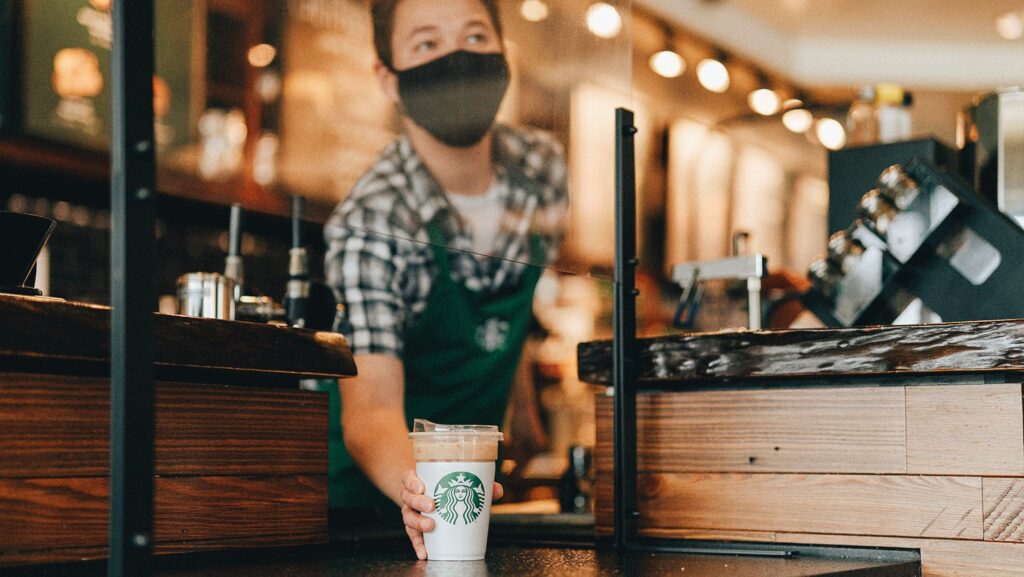Starbucks is planning to phase out all single-use cups by 2025.
The move represents the chain’s overall goal to reduce its environmental footprint and to become “resource positive” in the coming years. Its launch coincides with the retirement of current CEO Kevin Johnson, announced earlier today, who has spearheaded many of the company’s recent eco-conscious pledges.
Starbucks now plans to make every store in the US and Canada reusable cup-friendly—including at drive-thrus and for mobile orders—by encouraging customers to bring their own. If required, Starbucks will provide a “Borrow Cup” for a $1 deposit, and plans to also introduce similar programs in Japan, Singapore, and the UK. (The UK’s Boston Tea Party chain of stores has already introduced a similar “Ecoffee” cup system with great success, despite some brief, initial pushback from single-use devotees.)
Starbucks UK already charges 5p for a single-use cup and even offers a 25p discount for customers who supply their own reusable container. As with many cafes, the company temporarily paused the use of “keep-cups” in response to hygiene and COVID-19 concerns.

Starbucks ditches single-use cups
Starbucks announced the new-and-improved reusable cup initiative ahead of its upcoming annual shareholder meeting in order to reinforce its broader environmental goals and pledges of sustainability, specifically a 50 percent reduction in overall waste by 2030.
As part of this announcement, Starbucks has also debuted the new Partner Waste Recycling App, designed to help employees navigate each store and area’s recycling guidelines.
“We have a bold long-term sustainability vision and ambitious goals for 2030,” said Johnson. “Starbucks partners around the world are passionate about protecting our planet and are at the very center of driving the innovation that enables us to give more than we take.”
Starbucks remains the single largest international coffee chain with more than 32,000 stores worldwide. It sells several billion beverages every year, 98.7 percent of which baristas serve in single-use, disposable cups. The vast majority of these are then not disposed of properly.
In 2018, Starbucks produced 868 kilotons—twice the weight of the Empire State building—of waste, including single-use cups. The same year, it used one billion cubic meters of water and produced 16 million tons of greenhouse gases.
Starbucks and sustainability
The majority of Starbucks’s environmental footprint comes from its reliance on meat and dairy products, both of which are resource-intensive, inefficient, and high-impact. However, the company is increasingly incorporating plant-based foods and beverages into its supply chain in order to counter this.
Starbucks also plans to “expand its roster of renewable energy and decarbonization projects” in the coming years. For example, today’s announcement also includes an upcoming pilot program between Starbucks and car manufacturer Volvo to promote and facilitate electric vehicles. By the end of 2022, up to 15 Volvo-branded EV chargers (powered by ChargePoint) will be placed at Starbucks stores along the 1,350-mile route between Denver and Seattle.
Ready access to vehicle charging stations is just one of the obstacles preventing people from embracing electric cars, as is the time they take to “refuel.” (According to Volvo, its electric cars can go from 20 percent charged to 90 percent in 40 minutes.) Building charge points roughly every 100 miles along this route will support both travelers and local residents.
By building its own infrastructure, Starbucks will be able to encourage reduced-impact transportation and potentially gain new customers in the form of waiting motorists. The company is not alone in recognizing this unique opportunity in a changing industry, and Taco Bell recently installed six new charging points at a San Francisco restaurant.


